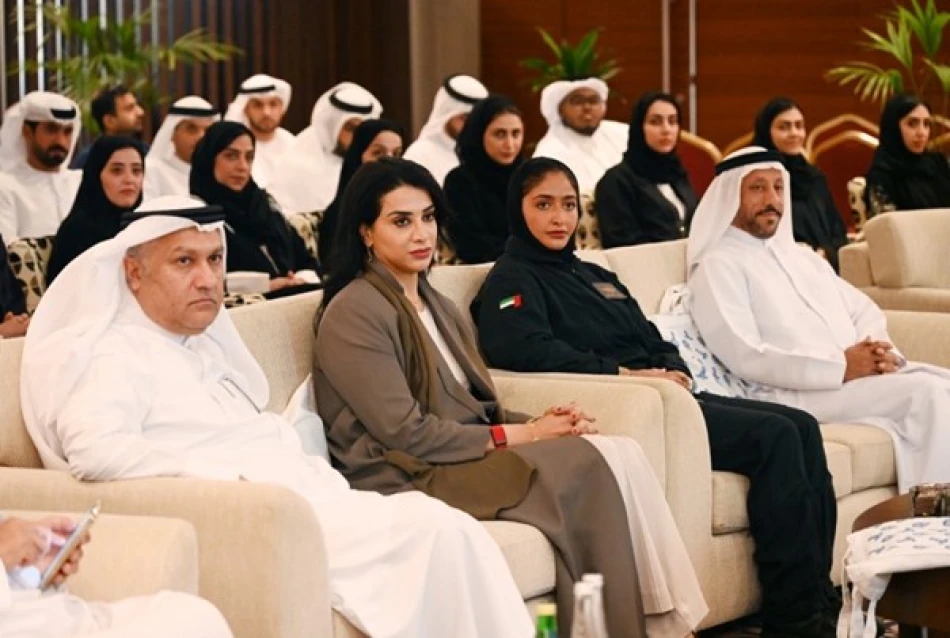
Sharjah Chamber Celebrates Emirati Women's Day, Renews Commitment to Empower Women Entrepreneurs
UAE's Sharjah Chamber Celebrates Women's Economic Rise as Gender Parity Vision Takes Shape
The Sharjah Chamber of Commerce and Industry marked UAE Women's Day with renewed commitments to economic empowerment, highlighting the nation's climb to first place regionally in the World Bank's "Women, Business and the Law 2023" report. The celebration underscored how systematic policy changes are translating into measurable business outcomes, positioning the UAE as a regional leader in gender-inclusive economic growth.
From Vision to Economic Reality
The event, held under the national theme "Hand in Hand, We Celebrate the 50th," demonstrated how the UAE's strategic approach to women's empowerment extends far beyond ceremonial recognition. Abdullah Sultan Al Owais, Chairman of Sharjah Chamber's Board of Directors, emphasized that women's contributions to the national economy have reached "record levels" — a statement backed by concrete policy achievements.
The chamber reaffirmed its commitment to the "Mother of the Emirates 50:50 Vision," launched by Sheikha Fatima bint Mubarak. This initiative aims to ensure gender parity in leadership positions over the next five decades, setting measurable targets rather than aspirational goals.
Technology and AI: The New Frontier for Women Entrepreneurs
Mohammed Ahmed Amin Al Awadi, Director General of Sharjah Chamber, outlined specific mechanisms supporting women in the private sector. The chamber's approach focuses heavily on technology and artificial intelligence sectors, recognizing these as high-growth areas in the global digital economy.
Programs like "Trade 101" serve as foundational support for small and medium enterprises, while specialized training in innovation and digital transformation prepares women to lead tech ventures. This strategy mirrors successful models in Singapore and Estonia, where targeted tech training for women has yielded significant economic returns.
Beyond Startups: Heritage Industries as Economic Drivers
Maryam Saif Al Shamsi highlighted the chamber's support for traditional crafts and productive families, pointing to the Heritage and Craft Industries Center established in 1978. This center has historically empowered thousands of families and represents a scalable model for community-based women's enterprises.
This dual approach — supporting both cutting-edge technology ventures and traditional industries — reflects the UAE's broader economic diversification strategy, where women play crucial roles across multiple sectors.
Regional Leadership with Global Implications
The UAE's first-place regional ranking in the World Bank's business environment report for women signals more than domestic progress. It positions the country as a model for Gulf states seeking to maximize their human capital potential. Saudi Arabia's Vision 2030 and Qatar's National Vision 2030 both emphasize women's economic participation, but the UAE's systematic approach and measurable outcomes provide a roadmap others can follow.
For international investors and multinational corporations, the UAE's gender-inclusive business environment offers operational advantages. Companies can tap into a broader talent pool while benefiting from government support structures designed to facilitate women's professional advancement.
Market Impact and Future Trajectory
The celebration featured success stories from diverse fields, including aviation and business leadership, demonstrating how policy changes translate into individual career achievements. Sheikh Moza Al Maktoum, a pilot captain, and Halima Hamid Al Owais, board member of Sharjah Chamber, shared experiences that illustrate the practical outcomes of systematic empowerment efforts.
This institutional approach — combining policy support, targeted training, and measurable outcomes — suggests the UAE's women's empowerment initiatives will likely accelerate rather than plateau. The focus on technology and AI sectors positions women entrepreneurs to capitalize on global digital transformation trends, while support for traditional industries ensures inclusive growth across economic sectors.
The implications extend beyond gender equity to economic competitiveness. Countries that successfully integrate women into their economies typically see higher GDP growth rates and greater innovation capacity. The UAE's systematic approach suggests it's positioning itself not just as a regional leader, but as a global example of how strategic gender inclusion drives economic performance.
Most Viewed News

 Layla Al Mansoori
Layla Al Mansoori






